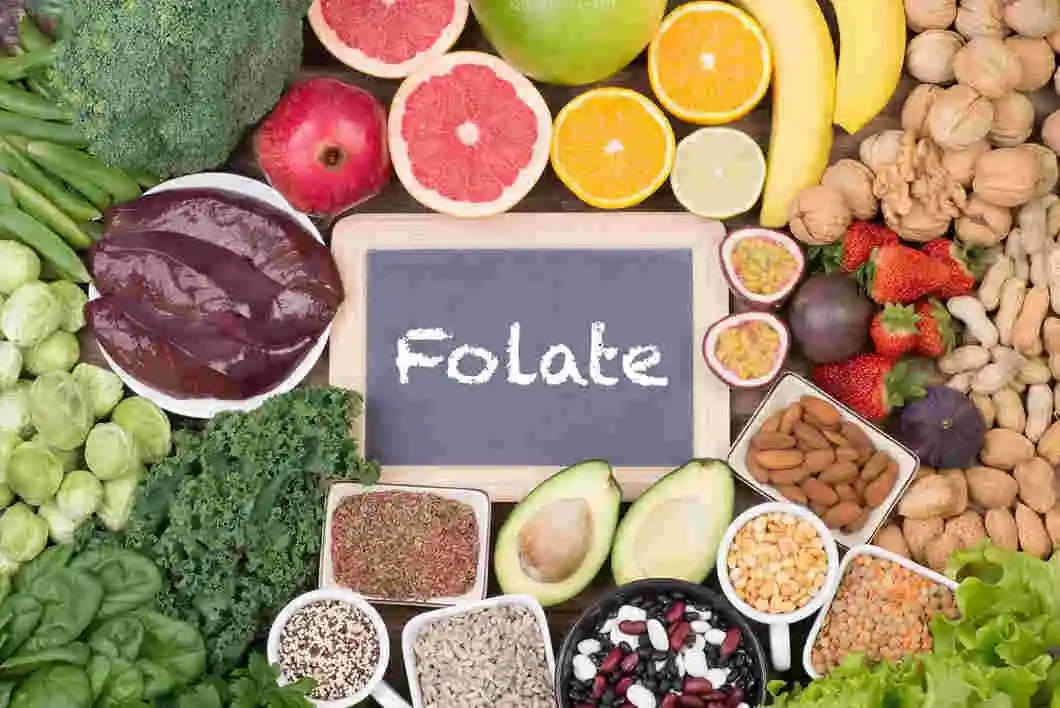Folate and Folic Acid are supplements for vitamin B9 deficiency. It, also known as vitamin B9, is essential in promoting overall health. Although it is well known for its importance during pregnancy, its benefits extend beyond that stage.
This exploration will explore the eight advantages of incorporating folic acid-rich foods into your diet.
8 Benefits of Folic Acid-Rich Foods in Your Diet
Here are 8 benefits of incorporating folic acid-rich foods into your diet:
- Promotes Heart Health: Folic acid helps lower homocysteine levels, reducing the risk of heart disease.
- Supports Brain Function: It aids in producing neurotransmitters, essential for cognitive function.
- Boosts Mood: Folic acid plays a role in serotonin regulation, promoting a positive mood.
- Enhances Pregnancy Health: Vital for fetal development, reducing the risk of birth defects like spina bifida.
- Improves Digestive Health: Folic acid aids in proper digestion and nutrient absorption.
- Strengthens Immunity: It supports the production of white blood cells, which are crucial for fighting infections.
- Promotes Healthy Skin: Folic acid contributes to skin cell regeneration and repair.
- May Reduce Cancer Risk: Some studies suggest folic acid may help prevent certain cancers, though more research is needed.
1. Important for fetal development
Foods high in folic acid are widely known for their beneficial effects on fetal development during pregnancy. Adequate folic acid intake early in pregnancy is essential because it helps prevent neural tube abnormalities in the growing fetus.
Any abnormality in the neural tube, which develops into the baby’s brain and spinal cord, might have significant health consequences.
Because of this, it’s frequently advised that fertile women get enough folic acid from their food or supplements to ensure a safe pregnancy.
Foods containing folic acid, such as legumes, fortified grains, and leafy green vegetables, play a significant role in helping to meet the increased demand for this essential nutrient during pregnancy.
2. Supports DNA Synthesis and Repair
Like a cell’s instruction book, folic acid is essential for making and looking after DNA. It helps with many jobs in the body that make and take care of DNA.
Having enough folic acid helps with growing. It is also developed by assisting cells in splitting and keeping DNA strong.
Eating foods with lots of folic acid can ensure you get enough of this important stuff. Which helps keep your DNA working well and reduces the chances of gene problems.
3. Promotes Red Blood Cell Formation and Anemia Prevention
The body needs folic acid to make red blood cells. Folic acid, iron, and vitamin B12 together prevent anemia, which occurs when the blood lacks hemoglobin or red blood cells. Anaemia makes you tired and weak and can cause other health problems.
Eating foods with lots of folic acids, like spinach, lentils, and beans, helps make healthy red blood cells and helps prevent or treat anemia.
4. Cardiovascular Health and Homocysteine Regulation
High levels of homocysteine in the blood can lead to heart problems. Folic acid helps break down homocysteine and keeps the heart healthy.
It also helps prevent damage to arteries and keeps blood vessels strong. By changing homocysteine into methionine.
Eating foods with lots of folic acid can help control homocysteine levels. Making your heart healthier and reducing the risk of heart problems.
5. Mental Health and Cognitive Function
Folic acid is linked to mental and cognitive health. Folic acid helps make chemicals in the brain that affect mood. Not having enough folic acid can raise the chances of feeling sad and having problems.
Foods like avocados, citrus fruits, and fortified cereals contain a lot of folic acid. Eating these foods can improve the functioning of your mind and brain and make you feel happier while lowering your chances of having mood problems and thinking issues.
6. Enhances Immune System Performance
Folic acid helps keep your immune system strong. It helps your immune cells grow and work well like white blood cells. These cells are essential for fighting off sicknesses. A healthy immune system is critical for staying well.
Eating foods with lots of folic acid helps your body fight infections better. It gives your immune system the help it needs to work well.
7. Encourages Hair and Skin Health
Folic acid is crucial for making all your body’s different cells and tissues, like hair and skin. It helps in making DNA and RNA. Not having enough folic acid can cause problems like skin rashes, hair loss, and sores in the mouth. Eating enough folic acid can help keep your hair and skin healthy.
Foods with lots of folic acid, such as lentils, asparagus, and broccoli, are suitable for your skin and hair.
8. Lowers the Chance of Specific Cancers
Research suggests that eating enough folic acid could reduce the risk of certain cancers. Folic acid, a type of vitamin B9, is found in food and has been linked to lowering the risk of breast, colorectal, and other cancers. One reason it might help prevent cancer is that it helps make and fix DNA.
Eating foods with lots of folic acid, along with other healthy choices. It might lower the risk of getting some cancers and make you healthier.
Final Word
Beyond its well-known role in pregnancy, eating foods high in folic acid can have a range of positive effects on your health. Folic acid is a nutritional powerhouse that helps with DNA synthesis, prevents anemia, promotes cardiovascular health, and lowers the risk of some malignancies.
Adopting a diet high in foods high in folate is a proactive measure to preserve general health and well-being throughout life. I hope you now understand the benefits of folic acid through this blog.

